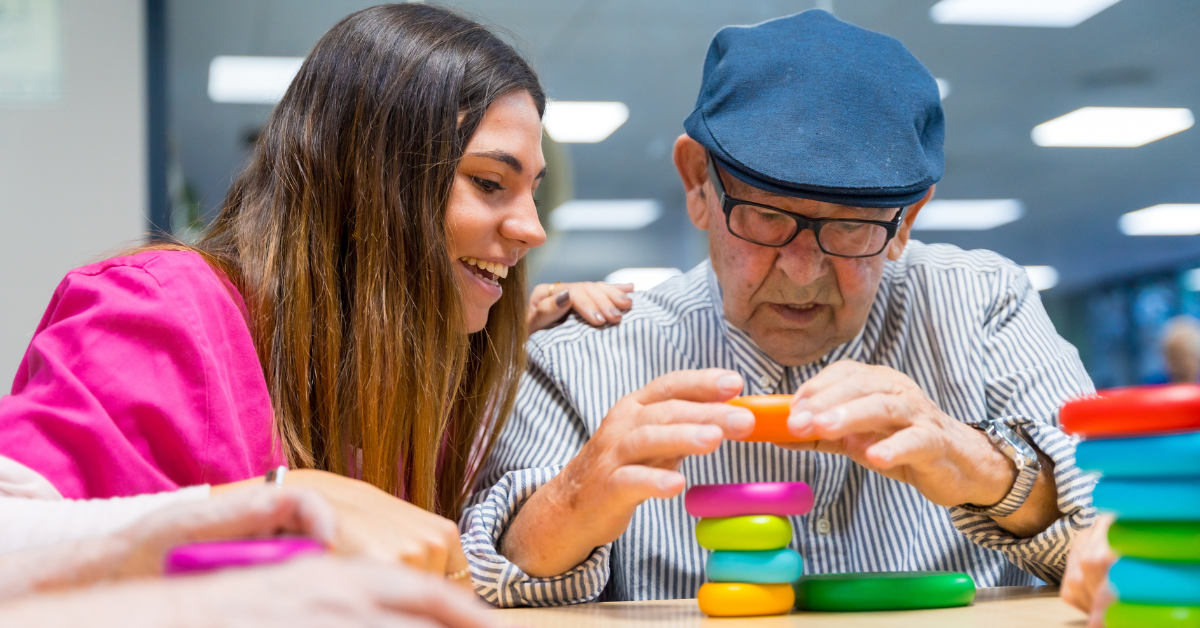
You might wonder how to create meaningful moments during your visits to memory care in Monona, WI. The beautiful truth? It doesn’t require elaborate planning. Sometimes, a warm hug or sharing a cherished story does more than any complex activity. Your five senses become powerful tools for building those special bonds between generations—connections that lift both older adults and their younger family members. This guide will walk you through celebrating Grandparents Day using sensory activities designed specifically for those in memory care. These approaches recognize where your loved one is now while honoring who they’ve always been.
Celebrating Through the Five Senses
Something remarkable happens when we connect with loved ones through their senses. For seniors in memory care, these experiences become bridges to memories, emotions and relationships that matter most. When cognitive abilities shift, the five senses remain reliable pathways to reach the person you’ve always known and loved.
1. Sight: Photo albums and memory walls
Visual memories often remain vivid even when other recollections fade. A thoughtfully created photo album tells their life story through images that matter—family gatherings, special occasions and everyday moments that shaped who they became. Keep it simple: one or two pictures per page helps them focus without feeling overwhelmed. These albums do more than spark memories. They provide comfort and reduce the isolation that memory challenges can bring.
2. Sound: Favorite songs and sing-alongs
Music works differently in the brain. Even when words become difficult, melodies can still reach them. People with dementia who participate in singing activities show improved quality of life, better cognition and enhanced well-being. The songs from their young adult years, particularly those from ages 18 to 25, hold special power to awaken memories and emotions that seemed lost.
3. Touch: Textured crafts and hand massages
Never underestimate the comfort of a gentle touch. Throughout memory challenges, this sense remains a powerful way to communicate care and affection. A simple hand massage with scented lotion can ease anxiety and create moments of peace. Your touch says what words cannot: “You matter. You are loved. You are not alone.” Textured crafts offer another avenue for connection. Working with different materials—smooth stones, soft fabric, rough sandpaper—engages motor skills while providing sensory experiences that can soothe and stimulate in equal measure.
4. Smell: Scented oils and flower arranging
Scents travel straight to the brain’s memory centers, often triggering vivid recollections. Essential oils can become tools for comfort and connection. Lavender brings calm, lemon balm soothes anxiety and peppermint can increase alertness and focus. Flower arranging combines the therapeutic power of scent with hands-on activity. Working with fresh blooms lifts spirits, reduces stress and gives residents a chance to create something beautiful.
5. Taste: Baking and sharing traditional treats
Food connects us to our past like few other experiences can. Baking together engages multiple senses—the feel of dough, the aroma filling the kitchen, the satisfaction of tasting something made with care. Simple activities like making cookies or bread allow your loved one to participate in tasks that once brought them joy. Break recipes into manageable steps. Let them help measure, stir or simply watch the magic happen.
Tips for Meaningful Family Involvement
Simple ways kids can participate
Kids have this amazing ability to meet grandparents exactly where they are. They don’t overthink it or worry about saying the wrong thing. Taking cues from your loved one’s interests and abilities makes these interactions successful. Young children can easily:
- Look through family photo albums together
- Sing familiar songs or try karaoke
- Help with planting flowers or arranging them
- Draw with sidewalk chalk or paint
Creating keepsakes together
Memory boxes hold tremendous power for preserving connections that matter. Children can help decorate these special containers filled with meaningful objects. Scrapbooking offers another hands-on approach where kids and grandparents co-create lasting mementos together.
Using video calls to include everyone
Distance doesn’t have to mean disconnection. When family members can’t visit in person, technology becomes a bridge. Video calls enable distant relatives to participate in celebrations. You might plan virtual events with themes, share photos digitally or play online games that everyone can enjoy, regardless of location.
Encouraging emotional connection through play
Play never gets old—it simply changes form. Board games, puzzles and card games keep minds engaged. Music often reaches places that words cannot, so try singing together or simply listening to favorite tunes. Outdoor activities like chasing butterflies or birdwatching create those spontaneous moments of joy in nature.
Creating Bridges
Grandparents Day opens a door to something beautiful—the chance to connect with your loved one through experiences that touch their heart and awaken their spirit. When you engage their senses, you’re not just planning an activity. You’re creating bridges to recognition and joy that memory challenges cannot destroy.
Here’s what matters most: the heart behind your efforts, not their complexity. These sensory moments benefit everyone involved, creating pockets of happiness and recognition that persist long after the activity ends. Want to explore how our memory care can make this Grandparents Day special? Call us at (608) 441-9990 to schedule a tour of Heritage Monona.
FAQs
Q1. How can I celebrate Grandparents Day with a loved one in memory care? You can celebrate through sensory activities like looking at photo albums, listening to favorite songs, engaging in textured crafts, using scented oils or sharing traditional treats. These activities stimulate the senses and can trigger memories and emotions.
Q2. What are some age-appropriate activities for memory care residents? Choose simple, low-maintenance tasks that match their current abilities and interests. Focus on activities they’ve enjoyed in the past, but be ready to adapt if needed. Remember, the goal is to create a positive experience, not necessarily to complete a task perfectly.


